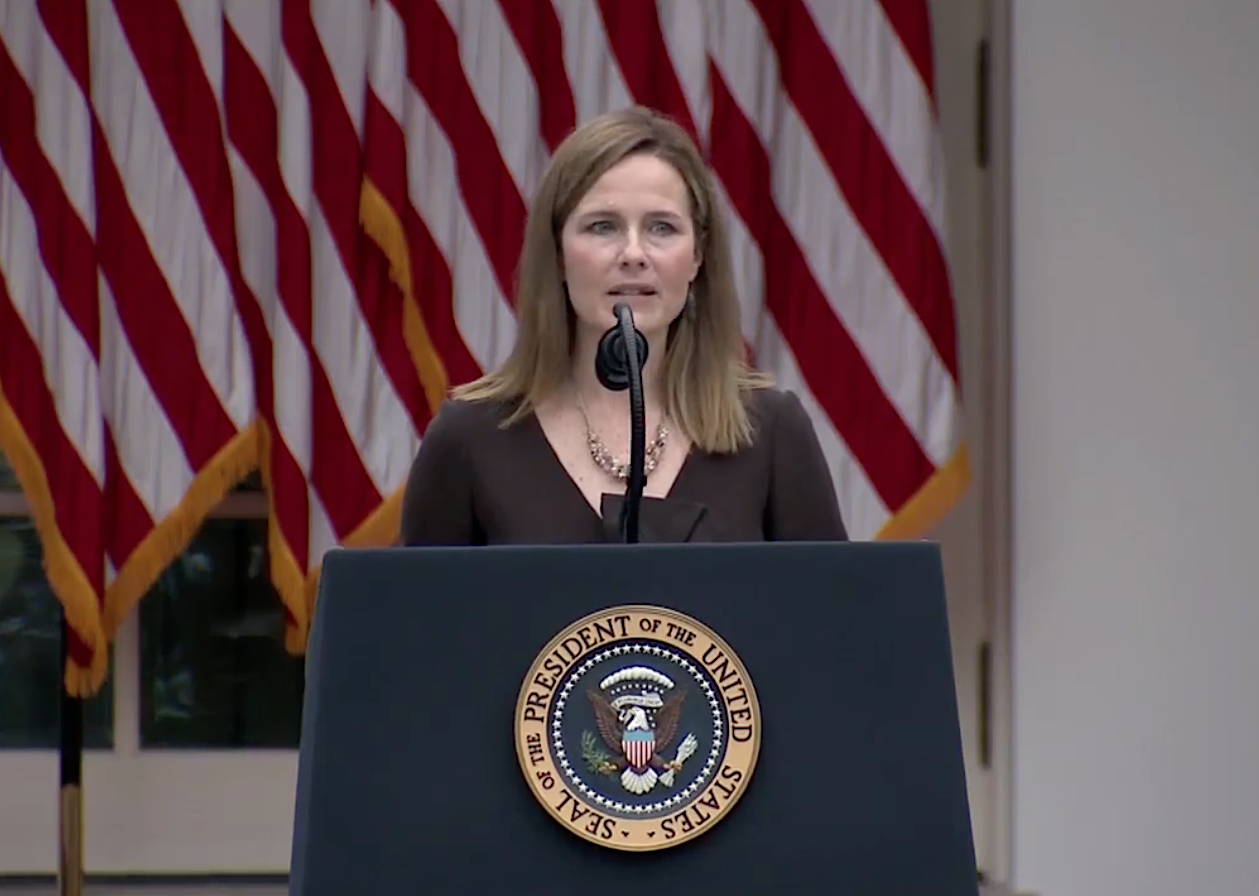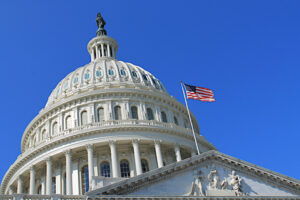
WASHINGTON—President Donald Trump at the White House on Saturday introduced federal appeals court Judge Amy Coney Barrett as his Supreme Court nominee, setting off a confirmation battle that could secure a conservative court for generations.
“She is a woman of unparalleled achievement, towering intellect and sterling credentials and unyielding loyalty to the Constitution,” Trump said in remarks in the Rose Garden with Barrett standing at his side. Barrett’s husband, Jesse, and seven children were in the audience for the event, and took the stage with her at the conclusion.
The president said Barrett “will decide cases based on the text of the Constitution as written.”
Barrett, 48, who sits on the 7th Circuit Court of Appeals in Chicago, is a favorite among conservatives for her anti-abortion views, and given her age could serve on the highest court in the land for decades since justices are appointed for life. Her confirmation would give conservatives six of the court’s nine seats, potentially shifting rulings considerably to the right.
“My fellow Americans, the president has nominated me to serve on the United States Supreme Court, and that institution belongs to all of us,” Barrett said to the crowd of about 150 in the Rose Garden. “If confirmed, I would not assume that role for the sake of those in my own circle, and certainly not for my own sake.”
She said she looked forward to the confirmation process.
“I have no illusions that the road ahead of me will be easy, either for the short term or the long haul,” she said.
Senate Republicans are scrambling to schedule what’s expected to be mid-October nomination hearings before the Judiciary Committee for Barrett. Outraged Democrats have pointed out that would amount to unprecedented speed, with only 37 days from Saturday until the presidential election on Nov. 3.
Both of Georgia’s GOP senators have pushed to move forward with confirmation, with Sen. Kelly Loeffler calling for a Senate vote before Election Day. Sen. David Perdue called Barrett an “outstanding choice” Saturday and said the chamber “will now move with due haste to consider Judge Barrett’s nomination.” Both senators are locked in tough election battles.
“This is about more than one seat. This is about saving our Republic by maintaining the balance of power between our three branches of government,” Perdue said in a statement Saturday.
Perdue’s opponent, Democrat Jon Ossoff, questioned whether Barrett would be impartial on major issues like abortion and former President Barack Obama’s signature health care law and said a “thorough, deliberative, and full vetting” is needed.

“My opponent doesn’t care. He’s not asking these questions. He’s already made up his mind. Because, for him, it’s all about party loyalty — no matter the consequences for his own constituents,” Ossoff said in a statement Sunday.
A White House pool report said that North Carolina Sen. Thom Tillis, a Republican and a member of the Senate Judiciary Committee, was among those present in the Rose Garden, as were fellow GOP Sens. Josh Hawley of Missouri and Deb Fischer and Ben Sasse of Nebraska. Hawley and Sasse also sit on the committee.
Trump said he expects the nomination process to be fairly quick.
“This should be a straightforward and prompt confirmation,” he said, adding, “Should be easy.”
Trump after his remarks was scheduled to head to a rally outside Harrisburg, Pa., scheduled for later Saturday. As they waited for Trump to speak at Harrisburg International Airport, just outside the capital city, supporters welcomed the news.
“I’m happy as h*ll he picked someone,” said Toni, a 58-year-old nurse from Harrisburg who declined to give her last name.
Toni didn’t vote for Trump in 2016, but backs him now. She’s fearful of what America would look like under a Democratic president after a summer of protests over racial injustice.
She also said she thinks the election, where millions will cast ballots by mail, will be disputed. So “we’re going to need some help in November,” she said.

Four years ago, Senate Majority Leader Mitch McConnell (R-Ky.) refused to hold a confirmation hearing for President Barack Obama’s last Supreme Court nominee Judge Merrick Garland, arguing that the seat should not be filled in an election year. That nomination came 237 days before the 2016 presidential election.
Former Vice President Joe Biden, the Democratic nominee for president, criticized Trump for nominating a Supreme Court Justice before a next president is selected.
“The United States Constitution was designed to give the voters one chance to have their voice heard on who serves on the Court,” Biden said in a statement. ”The Senate should not act on this vacancy until after the American people select their next president and the next Congress.”
On average in recent decades it’s taken 43 days from the time of a president’s formal submission of a nominee to the Senate until the first public hearing, according to a Congressional Research Service report that looked at Supreme Court nominees from 1975 to 2018.
Barrett would replace the late Justice Ruth Bader Ginsburg, who died on Sept. 18 at the age of 87 of complications of metastatic pancreatic cancer.
A second favorite nominee was Judge Barbara Lagoa of the U.S. Court of Appeals for the 11th Circuit, because of her Cuban American heritage and ties to Florida, a key battleground state between Trump and Democratic opponent former Vice President Joe Biden. The 11th Circuit has as its jurisdiction Florida, Georgia, and Alabama.
Barrett in her remarks Saturday took note of Ginsburg’s legacy.
“Should I be confirmed, I will be mindful of who came before me,” she said.
“Justice Ginsburg began her career at a time when women were not welcome in the legal profession. But she not only broke glass ceilings, she smashed them.”
“She was a woman of enormous talents and consequence, and her life of public service serves as an example to us all, particularly poignant to me was her long and deep friendship with Justice Antonin Scalia, my mentor.”
Two Republican senators, Susan Collins of Maine and Lisa Murkowski of Alaska, have already announced their objections to quickly filling the Supreme Court vacancy left by Ginsburg — a liberal icon known as a champion of equality and women’s rights. They have called for the seat to be filled after the November election, although it’s not clear if Collins would be an automatic “no” vote against a Trump nominee.
Before Ginsburg died, she dictated to her granddaughter, Clara Spera: “My most fervent wish is that I will not be replaced until a new president is installed.”
Senate Democrats have called for the court seat to remain vacant until Inauguration Day and have criticized McConnell for his rush while the U.S. is struggling to contain the coronavirus pandemic. More than 200,000 Americans have died this year from COVID-19 and more than 7 million are infected.
Democrats and liberal advocates fear a more conservative court could overturn or chip away at historic cases such as Roe v. Wade, which gives women the choice to access abortions, or the Affordable Care Act, the health care law enacted during the Obama administration that’s been under attack for years by Republicans.

Biden noted that Barrett has a written track record of disagreeing with the landmark decision by the high court in 2012 upholding the health care law.
“President Trump has been trying to throw out the Affordable Care Act for four years. Republicans have been trying to end it for a decade,” Biden said.
Senate Democrats have objected strongly. “Leader McConnell has spent the last six months ignoring this pandemic and this economic crisis, and now he wants to pack the court—this is supposed to serve the American people and dispense fair justice—he wants to pack the court in a way that will put another corporate special interest judge on the court with another judge who always rules for corporations over workers,” Sen. Sherrod Brown (D-Ohio) said on the Senate floor Friday.
However, Republicans hold 53 seats in the Senate, so even with defections by Collins and Murkowski, they still would have enough votes for a Supreme Court confirmation, which only requires a simple majority.
“With a unified Senate and White House, there is a clear historical precedent to move forward in this nomination process,” Sen. Chuck Grassley (R-Iowa) tweeted Saturday. “The Senate has the constitutional role to advise and consent to judicial nominees.”
If Barrett is confirmed, she would be the fifth woman to serve on the Supreme Court and the youngest member, which is currently Justice Brett Kavanaugh at 55.
She would also be Trump’s third appointee to the high court, following Kavanaugh and Justice Neil Gorsuch.
Barrett grew up in a suburb of New Orleans and attended a Catholic high school there. She graduated magna cum laude from Rhodes College in Memphis, Tenn., in 1994 and summa cum laude from Notre Dame with a law degree in 1997. She was a clerk for Judge Laurence Silberman of the U.S. Court of Appeals for the District of Columbia Circuit and then with the late Justice Antonin Scalia in 1998 and 1999 before embarking on a career teaching law at Notre Dame.
Barrett gained attention during her contentious confirmation hearing for the 7th Circuit in 2017 when she was questioned by Sen. Dianne Feinstein (D-Calif.) about her religious beliefs and how they played into her legal views.
“You have a long history of believing that your religious beliefs should prevail,” Feinstein, the top Democrat on Judiciary, said to Barrett. “The dogma lives loudly within you.”
That line of questioning rallied the religious right and the anti-abortion movement around Barrett.
“If you’re asking whether I take my faith seriously and I’m a faithful Catholic, I am,” Barrett told the Senate Judiciary Committee. “Although I would stress that my personal church affiliation or my religious belief would not bear in the discharge of my duties as a judge.”
She was confirmed nearly along party lines with a 55-43 vote.
Barrett shares Scalia’s originalist views that the Constitution should be interpreted by those who wrote and ratified it in 1787.
“The Constitution’s meaning is fixed until lawfully changed; thus, the court must stick with the original public meaning of the text even if it rules out the preference of a current majority,” she wrote in a 2017 law review.
In her speech shortly after the president formally nominated her, Barrett spoke about how influential the late Justice Scalia was to her.
“His judicial philosophy is mine too,” she said of her former mentor. “A judge must apply the law as written. Judges are not policymakers and they must be resolute at setting aside any policy views they might hold.”
Scalia’s widow, Maureen, and his son, Labor Secretary Eugene Scalia, were in the audience for Trump’s announcement.
While working as a faculty member at Notre Dame Law School, Barrett was a member of the Faculty for Life, an anti-abortion group.
Before she was appointed a circuit court judge, Barrett spoke about her views on the future of abortion in a 2016 talk at Jacksonville University. She said that while she doesn’t think the right to abortion legalized in Roe v. Wade would go away, states might place their own restrictions on late-term abortions.
“I think the question of whether people can get very late-term abortions, you know, how many restrictions can be put on clinics, I think that would change,” she said during the talk.
During her time in the 7th Circuit, she considered an abortion case on an Indiana law that required fetal remains of an abortion or miscarriage to be buried, rather than allowing clinics to dispose of the remains.
The law, signed by former Gov. Mike Pence, who’s now vice president, also prevented abortions on the basis of race, sex or disabilities. The 7th Circuit panel found the law unconstitutional, but Barrett and three other conservative judges wrote a dissenting opinion that expressed skepticism that the law was unconstitutional.
Stephen Caruso outside Harrisburg and Jill Nolin in Atlanta contributed to this report. This article appears in partnership with Georgia Recorder






